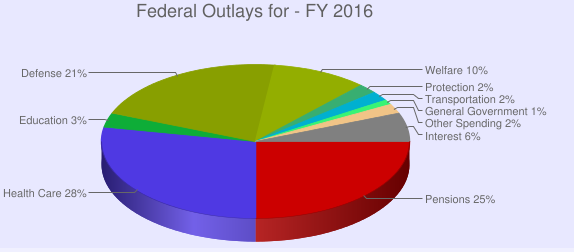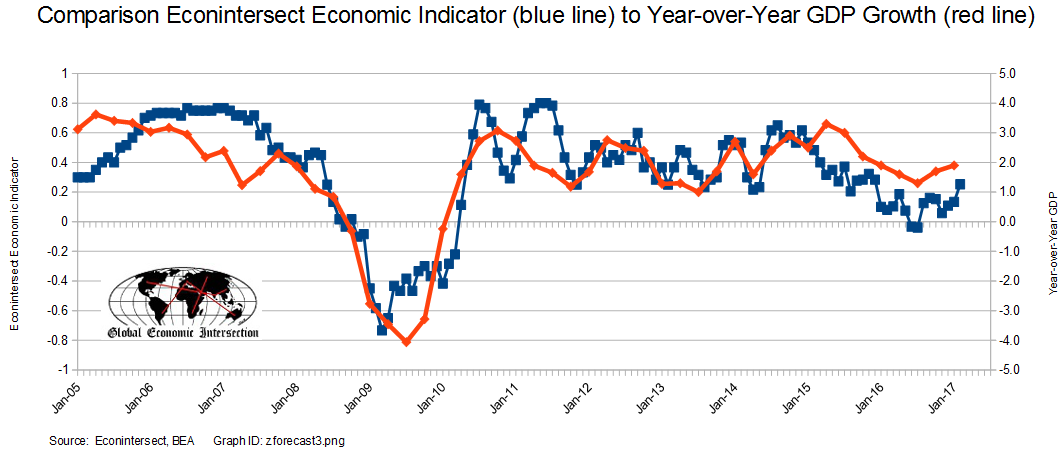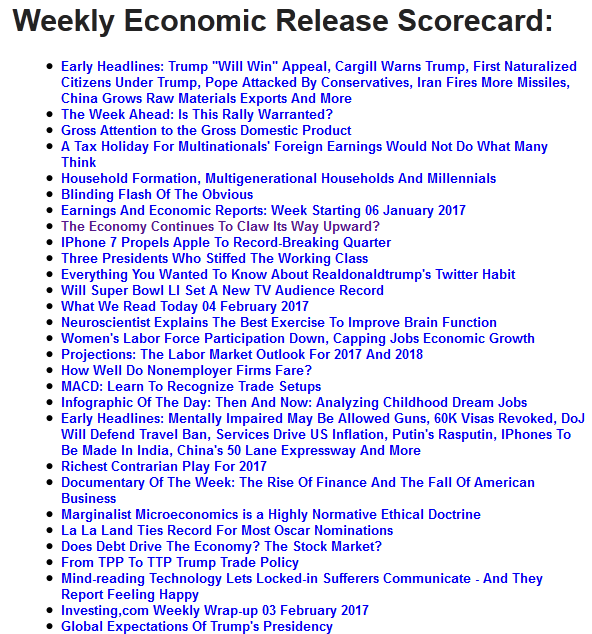Will the Trump administration effect the economy - either positively or negatively? I have written in the past that it takes a long time (except for helicopter drops of money directly to consumers) for fiscal policy actions to impact the economy overall.
Follow up:
So far, the only event since 20 January I have seen which would affect the USA economy is the increase in consumer and business confidence starting the week of the election. I am not a fan of consumer confidence surveys for a variety of reasons - but I do lean towards the notion that spending increases generally correlate to a positive outlook.
Having said that there has been a general correlation, There are few (if any?) economic theories which rise to the level of a scientific law. Scientific laws are always true. If economic theories were laws - operation of economies would be push-button. If a fluctuation in the force was noted, the correct counter-dynamic would be executed and the economy would return to its planned trajectory. No more recessions.
Understandably, what is understood to be the economy has too many variables acting at once for simple laws to be discovered. Logically, if economic laws are ever discovered, it is likely they will be complex utilizing a daunting multiplicity of dynamics. It will never as simple as raising interest rates as the economy heats up, and lowering them when the economy slows.
I do have questions:
- The USA has a consumer driven economy. Using simple logic, the more money the consumer has - the more money the consumer can spend. The more money the consumer spends, the more the economy grows. Beginning this decade, the Western countries been faced with the ageing of the boomers (the largest population segment). They are now well past their highest spending years - and now a majority must survive mostly on social security benefits. Is it not in the best interests of the economy to ensure social security benefits are high enough to keep the economy growing? It is a joke to believe the benefits are properly inflation indexed.
- Taxes are a brake on the economy. Taxes take money from business and consumers who would spend it (if it was not given to government). The median family spends all their income. Why tax the lower end of the economy at all if it starves out their ability to spend?

- Since the end of WWII, the consumption end of the economy has been powered by relatively easy access to loans. Since the Great Recession, household debt servicing (as a percent of personal income) has fallen to the lowest levels in 35 years freeing up monies to be spent on even more consumption. Raising interest rates will be a brake on the economy as it raises the amounts of money to be repaid to the lender. Is it possible that consumer debt is acting as a brake on the economy as the majority of households are near their borrowing limits?
- Along the same lines, interest rates also affect treasury bills / bonds. Rising interest rates raises the interest payments on the Federal Debt. The Congressional Budget Office forecasts the budget spending will double in the next five years. Is there a reason the government needs to issue treasuries to cover deficit spending? After all, the Feds have no problem borrowing from internal accounts (such as social security) - or allowing the Federal Reserve to buy debt (quantitative easing). The dollar did not weaken while all this was going on. On top of that, interest is a tax on government also.
- It has been a long standing belief that debt fuels the economy. I can understand why short term consumer debt makes it easier to mitigate the bumps in ones personal life. I can understand why people must borrow to buy a home and a car. But why does one borrow long term for education? Growth of consumer debt has been powered by student loans since the Great Recession.
- Economics 101 says trade is economically positive for all parties involved. If a little trade is good, a lot is better? I have made a career out of playing sourcing games. For many items, the individual governments are eager to subsidize the deal to create or maintain jobs. Yes, the product IS cheaper but it will be a cold day in hell before I believe that blindly executed trade is a zero sum game. I am NOT arguing for trade wars or import taxes - but I am saying when the balance of trade between countries is not zero, the country with a trade deficit exported jobs and imported deflationary pressures.
I have seen little yet that President Trump has done anything to affect the economy - either positively or negatively. The political path since the 1960s has been to favor the needs of the 0.1% and business over the general population. I am waiting for any economic action where it is obvious the median household is favored over the 0.1 %. A statement in President Trump's inauguration address:
For too long, a small group in our nation's capital has reaped the rewards of government while the people have borne the cost. Washington flourished, but the people did not share in its wealth. Politicians prospered, but the jobs left. And the factories closed.
With interest rates on the rise, there is little question that the median household has a negative dynamic on their ability to spend.
Yet, there are positive economic trend lines now in play. Our economic forecast shows improvement - mostly caused by comparison to really terrible economic growth last year. Thus, an era of robust economic growth is hardly at hand at this juncture.

Have a great Superbowl Sunday.
Other Economic News this Week:
The Econintersect Economic Index for February 2017 again improved but the value remains in the territory of weak growth. The index remains well below the median levels seen since the end of the Great Recession. But there are several indications in the data we view of better dynamics in the future. Six-month employment growth forecast indicates little change in the rate of growth.
Bankruptcies this Week from bankruptcydata.com: Privately-held United Kingdom-based Toisa, Azure Midstream Partners, Vanguard Natural Resources, Privately-held Wet Seal
Click here to view the scorecard table below with active hyperlinks
Weekly Economic Release Scorecard:

